#the facebook effect
Note
IM SORRY IVE BEEN SO QUIET MY LIFES BEEN SO HECTIC LATELYYY
but oh my god I've read the first two chapters so far and 😭😭😭 Dustin mother hen Moskovitz and Mark being absolutely insane about fencing is sonethwt that can be SO personal to me I swear to GOD I'm trying not to find this adorable but I so am, just a little bit

“Later Moskovitz and the others banned fencing from the house.” ASHSEIBEDUJEHDIEHE THATS SO
Also Mark being distracting while fencing when talking with Sean? Should've been in the movie
Also ““Pretty soon they were naming the servers on which Thefacebook software was running after characters in Tom Cruise movies. “Where is that script running?” “It’s running on Maverick.” “Well, run it instead on Iceman, I need Maverick to test this feature.” THATS SO TO <3 I'm currently majoring in compsci and I find this so adorable
And ““I need servers as much as I need food. I could probably go a while without eating, but if we don't have enough servers then the site is screwed.” Maaaark. Maaaaaaaaaaark. Thats not how that works. Not how any of that works.
I think the part that got me the most was “Interviewed by the Harvard Crimson a few months later, Zuckerberg explained why he'd increased Moskovitz’s stake: “Everyone else was like, ‘What the fuck are you doing?’ And I was like, ‘What do you mean? He clearly does a lot of work.’”
FIRST OF ALL OH MY GOD THEYRE SO TO. wow. trying not to cry and cry a lot they make me SO…. the part about Dustin going home to learn PERL in a weekend even though the Facebook was originally written in php makes me so. that was so fucking sweet I'm melting
also mark swearing sends me idk why. it ALWAYS catches me off guard
I CANNOT WAIT TO READ MORE IM SO SORRY FOR RAMBLING work suxs and im actually writing my first tsn!mark/dustin fic so this has been my little treat SHSHSHDHD
I SWEAR the image of Mark just half-ignoring Sean while practicing fencing...and there is So Much that happens in just that one sentence about putting a stop to the fencing inside and I need to know everything lol.
And this book. The perl/php story never fails to get me.
I forget when the Adam D'Angelo story about Dustin comes up, maybe it already has, but that one truly takes me out. The dedication that Dustin shows...Mark does not deserve him and it is very interesting to watch their....everything.
👀👀 I support every mark/dustin fic, and if you want a beta or someone to look over it I am offering my services.
Also no no don't be sorry for rambling!!! I am loving the update, feel free to continue.
#asks#kazutoes#zuck posting#the facebook effect#up til now david kirkpatrick has been the only one who understood me (/j)#now another has joined!
3 notes
·
View notes
Text
like literally the singular time spotify has ever given me a “here’s what you were listening to last year!” notif and its the day my father died…..i swear theyre programmed to do this
4 notes
·
View notes
Text
Social Quitting

In “Social Quitting,” my latest Locus Magazine column, I advance a theory to explain the precipitous vibe shift in how many of us view the once-dominant social media platforms, Facebook and Twitter, and how it is that we have so quickly gone asking what we can do to get these services out of our lives to where we should go now that we’re all ready to leave them:
https://locusmag.com/2023/01/commentary-cory-doctorow-social-quitting/
The core of the argument revolves around surpluses — that is, the value that exists in the service. For a user, surpluses are things like “being able to converse with your friends” and “being able to plan activities with your friends.” For advertisers, surpluses are things like “being able to target ads based on the extraction and processing of private user data” and “being able to force users to look at ads before they can talk to one another.”
For the platforms, surpluses are things like, “Being able to force advertisers and business customers to monetize their offerings through the platform, blocking rivals like Onlyfans, Patreon, Netflix, Amazon, etc” and things like “Being able to charge more for ads” and “being able to clone your business customers’ products and then switch your users to the in-house version.”
Platforms control most of the surplus-allocating options. They can tune your feed so that it mostly consists of media and text from people you explicitly chose to follow, or so that it consists of ads, sponsored posts, or posts they think will “boost engagement” by sinking you into a dismal clickhole. They can made ads skippable or unskippable. They can block posts with links to rival sites to force their business customers to transact within their platform, so they can skim fat commissions every time money changes hands and so that they can glean market intelligence about which of their business customers’ products they should clone and displace.
But platforms can’t just allocate surpluses will-ye or nill-ye. No one would join a brand-new platform whose sales-pitch was, “No matter who you follow, we’ll show you other stuff; there will be lots of ads that you can’t skip; we will spy on you a lot.” Likewise, no one would sign up to advertise or sell services on a platform whose pitch was “Our ads are really expensive. Any business you transact has to go through us, and we’ll take all your profits in junk fees. This also lets us clone you and put you out of business.”
Instead, platforms have to carefully shift their surpluses around: first they have to lure in users, who will attract business customers, who will generate the fat cash surpluses that can be creamed off for the platforms’ investors. All of this has to be orchestrated to lock in each group, so that they won’t go elsewhere when the service is enshittified as it processes through its life-cycle.
This is where network effects and switching costs come into play. A service has “network effects” if it gets more valuable as users join it. You joined Twitter to talk to the people who were already using it, and then other people joined so they could talk to you.
“Switching costs” are what you have to give up when you leave a service: if a service is siloed — if it blocks interoperability with rivals — then quitting that service means giving up access to the people whom you left behind. This is the single most important difference between ActivityPub-based Fediverse services like Mastodon and the silos like Twitter and Facebook — you can quit a Fediverse server and set up somewhere else, and still maintain your follows and followers:
https://pluralistic.net/2022/12/23/semipermeable-membranes/#free-as-in-puppies
In the absence of interoperability, network effects impose their own switching cost: the “collective action problem” of deciding when to leave and where to go. If you depend on the people you follow and who follow you — for emotional support, for your livelihood, for community — then the extreme difficulty of convincing everyone to leave at the same time and go somewhere else means that you can be enticed into staying on a service that you no longer enjoy. The platforms can shift the surpluses away from you, provided that doing so makes you less miserable than abandoning your friends or fans or customers would. This is the Fiddler On the Roof problem: everyone stays put in the shtetl even though the cossacks ride through on the reg and beat the shit out of them, because they can’t all agree on where to go if they leave:
https://doctorow.medium.com/how-to-leave-dying-social-media-platforms-9fc550fe5abf
So the first stage of the platform lifecycle is luring in users by allocating lots of surplus to them — making the service fun and great and satisfying to use. Few or no ads, little or no overt data-collection, feeds that emphasize the people you want to hear from, not the people willing to pay to reach you.
This continues until the service attains a critical mass: once it becomes impossible to, say, enroll your kid in a little-league baseball team without having a Facebook account, then Facebook can start shifting its surpluses to advertisers and other business-users of the platform, who will pay Facebook to interpose themselves in your use of the platform. You’ll hate it, but you won’t leave. Junior loves little-league.
Facebook can enshittify its user experience because the users are now locked in, holding each other hostage. If Facebook can use the courts and technological countermeasures to block interoperable services, it can increase its users’ switching costs, producing more opportunities for lucrative enshittification without the risk of losing the users that make Facebook valuable to advertisers. That’s why Facebook pioneered so many legal tactics for criminalizing interoperability:
https://www.eff.org/cases/facebook-v-power-ventures
This is the second phase of the toxic platform life-cycle: luring in business customers by shifting surpluses from users to advertisers, sellers, etc. This is the moment when the platforms offer cheap and easy monetization, low transaction fees, few barriers to off-platform monetization, etc. This is when, for example, a news organization can tease an article on its website with an off-platform link, luring users to click through and see the ads it controls.
Because Facebook has locked in its users through mutual hostage-taking, it can pollute their feeds with lots of these posts to news organizations’ sites, bumping down the messages from its users’ friends, and that means that Facebook can selectively tune how much traffic it gives to different kinds of business customers. If Facebook wants to lure in sports sites, it can cram those sites’ posts into millions of users’ feeds and send floods of traffic to sports outlets.
Outlets that don’t participate in Facebook lose out, and so they join Facebook, start shoveling their content into it, hiring SEO Kremlinologists to help them figure out how to please The Algorithm, in hopes of gaining a permanent, durable source of readers (and thus revenue) for their site.
But ironically, once a critical mass of sports sites are on Facebook, Facebook no longer needs to prioritize sports sites in its users’ feeds. Now that the sports sites all believe that a Facebook presence is a competitive necessity, they will hold each other hostage there, egging each other on to put more things on Facebook, even as the traffic dwindles.
Once sports sites have taken each other hostage, Facebook can claw back the surplus it allocated to them and use it to rope in another sector — health sites, casual games, employment seekers, financial advisors, etc etc. Each group is ensnared by a similar dynamic to the one that locks in the users.
But there is a difference between users’ surpluses and business’s surpluses. A user’s surplus is attention, and there is no such thing as an “attention economy.” You can’t use attention to pay for data-centers, or executive bonuses, or to lobby Congress. Attention is not a currency in the same way that cryptos are not currency — it is not a store of value, nor a unit of exchange, nor or a unit of account.
Turning attention into money requires the same tactics as turning crypto into money — you have to lure in people who have real, actual money and convince them to swap it for attention. With crypto, this involved paying Larry David, Matt Damon, Spike Lee and LeBron James to lie about crypto’s future in order to rope in suckers who would swap their perfectly cromulent “fiat” money for unspendable crypto tokens.
With platforms, you need to bring in business customers who get paid in actual cash and convince them to give you that cash in exchange for ethereal, fast-evaporating, inconstant, unmeasurable “attention.” This works like any Ponzi scheme (that is, it works like cryptos): you can use your shareholders’ cash to pay short-term returns to business customers, losing a little money as a convincer that brings in more trade.
That’s what Facebook did when it sent enormous amounts of traffic to a select few news-sites that fell for the pivot to video fraud, in order to convince their competitors to borrow billions of dollars to finance Facebook’s bid to compete with Youtube:
https://doctorow.medium.com/metaverse-means-pivot-to-video-adbe09319038
This convincer strategy is found in every con. If you go to the county fair, you’ll see some poor bastard walking around all day with a giant teddy bear that he “won” by throwing three balls into a peach-basket. The carny who operated that midway game let him win the teddy precisely so that he would walk around all day, advertising the game, which is rigged so that no one else wins the giant teddy-bear:
https://boingboing.net/2006/08/27/rigged-carny-game.html
Social media platforms can allocate giant teddy-bears to business-customers, and it can also withdraw them at will. Careful allocations mean that the platform can rope in a critical mass of business customers and then begin the final phase of its life-cycle: allocating surpluses to its shareholders.
We know what this looks like.
Rigged ad-markets:
https://en.wikipedia.org/wiki/Jedi_Blue
Understaffed content moderation departments:
https://www.dw.com/en/twitters-sacking-of-content-moderators-will-backfire-experts-warn/a-63778330
Knock-off products:
https://techcrunch.com/2021/12/08/twitter-is-the-latest-platform-to-test-a-tiktok-copycat-feature/
Nuking “trust and safety”:
https://www.reuters.com/technology/twitter-dissolves-trust-safety-council-2022-12-13/
Hiding posts that have links to rival services:
https://www.makeuseof.com/content-types-facebook-hides-why/
Or blocking posts that link to rival services:
https://pluralistic.net/2022/12/19/better-failure/#let-my-tweeters-go
Or worse, terminating accounts for linking to rival services:
https://blog.joinmastodon.org/2022/12/twitter-suspends-mastodon-account-prevents-sharing-links/
That is, once a platform has its users locked in, and has its business customers locked in, it can enshittify its service to the point of near uselessness without losing either, allocating all the useful surplus in the business to its shareholders.
But this strategy has a problem: users and business customers don’t like to be locked in! They will constantly try to find ways to de-enshittify your service and/or leave for greener pastures. And being at war with your users and business customers means that your reputation continuously declines, because every time a user or business customer figures out a way to claw back some surplus, you have to visibly, obviously enshittify your service wrestle it back.
Every time a service makes headlines for blocking an ad-blocker, or increasing its transaction fees, or screwing over its users or business customers in some other way, it makes the case that the price you pay for using the service is not worth the value it delivers.
In other words, the platforms try to establish an equilibrium where they only leave business customers and users with the absolute bare minimum needed to keep them on the service, and extract the rest for their shareholders. But this is a very brittle equilibrium, because the prices that platforms impose on their users and business customers can change very quickly, even if the platforms don’t do anything differently.
Users and business customers can revalue the privacy costs, or the risks of staying on the platform based on exogenous factors. Privacy scandals and other ruptures can make the cost you’ve been paying for years seem higher than you realized and no longer worth it.
This problem isn’t unique to social media platforms, either. It’s endemic to end-stage capitalism, where companies can go on for years paying their workers just barely enough to survive (or even less, expecting them to get public assistance and/or a side-hustle), and those workers can tolerate it, and tolerate it, and tolerate it — until one day, they stop.
The Great Resignation, Quiet Quitting, the mass desertions from the gig economy — they all prove the Stein’s Law: “Anything that can’t go on forever will eventually stop.”
Same for long, brittle supply-chains, where all the surplus has been squeezed out: concentrating all the microchip production in China and Taiwan, all the medical saline in Puerto Rico, all the shipping into three cartels… This strategy works well, and can be perfectly tuned with mathematical models that cut right to the joint, and they work and they work.
Until they stop. Until covid. Or war. Or wildfires. Or floods. Or interest rate hikes. Or revolution. All this stuff works great until you wake up and discover that the delicate balance between paying for guard labor and paying for a fair society has tilted, and now there’s a mob building a guillotine outside the gates of your luxury compound.
This is the force underpinning collapse: “slow at first, then all at once.” A steady erosion of the failsafes, flensing all the slack out of the system, extracting all the surpluses until there’s nothing left in the reservoir, no reason to stay.
It’s what caused the near-collapse of Barnes and Noble, and while there are plenty of ways to describe James Daunt’s successful turnaround, the most general characterization is, “He has reallocated the company’s surpluses to workers, readers, writers and publishers”:
https://tedgioia.substack.com/p/what-can-we-learn-from-barnes-and
A system can never truly stabilize. This is why utopias are nonsense: even if you design the most perfect society in which everything works brilliantly, it will still have to cope with war and meteors and pandemics and other factors beyond your control. A system can’t just work well, it has to fail well.
This is why I object so strenuously to people who characterize my 2017 novel Walkaway as a “dystopian novel.” Yes, the protagonists are eking out survival amidst a climate emergency and a failing state, but they aren’t giving up, they’re building something new:
https://locusmag.com/2017/06/bruce-sterling-reviews-cory-doctorow/
“Dystopia” isn’t when things go wrong. Assuming nothing will go wrong doesn’t make you an optimist, it makes you an asshole. A dangerous asshole. Assuming nothing will go wrong is why they didn’t put enough lifeboats on the Titanic. Dystopia isn’t where things go wrong. Dystopia is when things go wrong, and nothing can be done about it.
Anything that can’t go on forever will eventually stop. The social media barons who reeled users and business customers into a mutual hostage-taking were confident that their self-licking ice-cream cone — in which we all continued to energetically produce surpluses for them to harvest, because we couldn’t afford to leave — would last forever.
They were wrong. The important thing about the Fediverse isn’t that it’s noncommercial or decentralized — it’s that its design impedes surplus harvesting. The Fediverse is designed to keep switching costs as low as possible, by enshrining the Right Of Exit into the technical architecture of the system. The ability to leave a service without paying a price is the best defense we have against the scourge of enshittification.
(Thanks to Tim Harford for inspiring this column via an offhand remark in his kitchen a couple months ago!)
[Image ID: The Phillip Medhurst Picture Torah 397. The Israelites collect manna. Exodus cap 16 v 14. Luyken and son.]
#pluralistic#social media#post-twitter#post-facebook#switching costs#network effects#web theory#locus magazine#exodus#decentralization
3K notes
·
View notes
Text
Autistic Masking
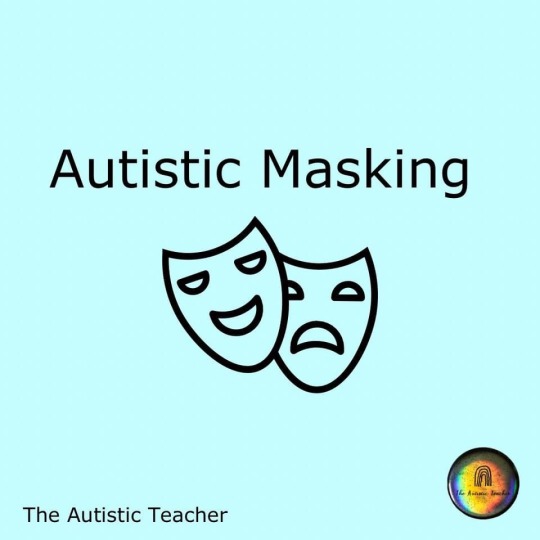
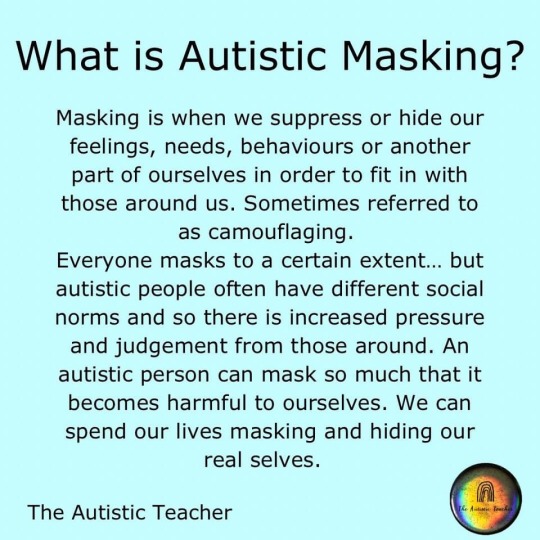
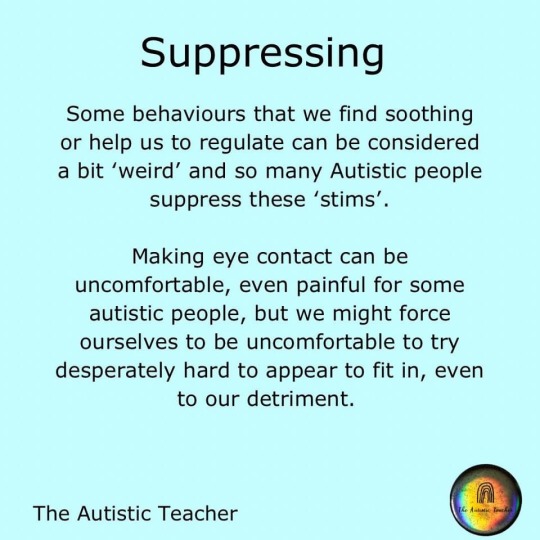
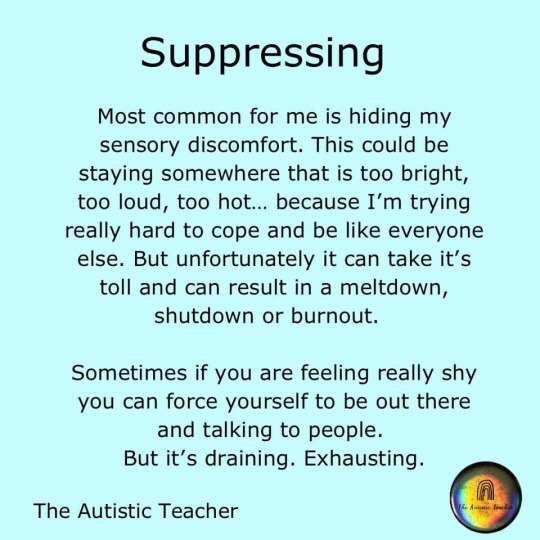
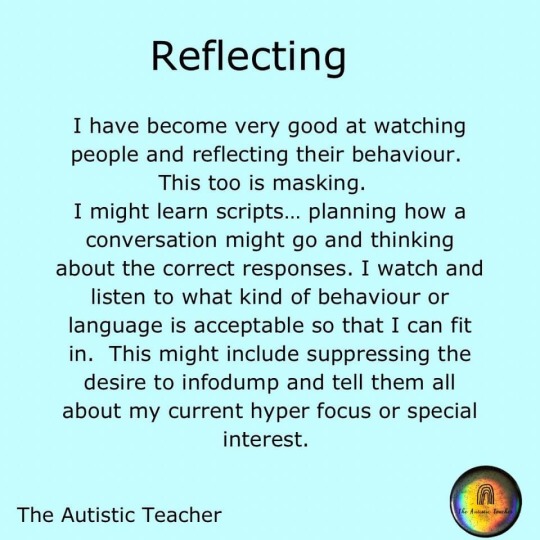


The Autistic Teacher
#autism#actually autistic#masking#effects of masking#reflecting#suppressing#neurodivergence#neurodiversity#actually neurodivergent#feel free to share/reblog#The Autistic Teacher (Facebook)
245 notes
·
View notes
Note
The House of El sure is different than the rest of the Kryptonians, and it's pretty clear that they're doing it on purpose, but what I want to know is, how much of their reasons boil down to "we don't trust Minder"?
next chapter has more jor-el, so i think the house of el's Whole Deal will become a lot easier to understand
#original#ficblogging#the slightly spoilery answer:#it's like saying an amish person doesn't trust facebook. like. they're probably not on facebook. but that's more of a side effect.
55 notes
·
View notes
Text

#memes#lol#funny#lol memes#funny memes#cgi#moon landing#graphics#special effects#video games#tomb raider#lara croft#facebook#facebook memes#conspiracies#conspiracy theories
304 notes
·
View notes
Text
the misinformation approach we’ve seen in high profile domestic violence cases like those of tory lanez, johnny depp, and now jonathan majors relies on internet blogs that already have artificial engagement, especially on twitter. we know johnny depp was caught paying for advertising and automated, artificial accounts to inflate negative discourse about amber heard. he and others also likely paid off influencers to make negative content about amber heard on instagram, youtube, and tik tok. tory lanez and jonathan majors have less money, but it likely does not take much to buy off a handful of youtube and twitter influencers that already profit off of womanhatred. you would be wise to doubt the veracity of their engagement as well. the so-called “mannosphere” aka the online vortex of male supremacy and womanhating is stock full of men who hate women; pay for followers, likes, and views; and are desperate for attention. hatred of women does sell, but i think the fact that this issue concerns the self-absorbed and perpetually dishonest world of internet charlatans, including so-called gossip blogs on instagram and twitter (notorious for their hateful content), you should doubt the reach they claim to have. not to mention, most people are not online to this extent. we do, however, need to be concerned about young children, who are most likely to be exposed to this and who are being brainwashed by male supremacists online.
#more people use youtube and facebook than anything else#its true and it poses a problem#but the real and lasting propaganda has real life counterparts#johnny depp was more successful because he weaponized traditional media#including HLN#i don’t want to downplay the effects of social media propaganda on people but i think we do overstate its influence
24 notes
·
View notes
Text
one time in third year when i was 14 and living in scotland a popular girl asked if she could copy my homework and i looked at her with 100% sincere surprise and disapproval and said "but then how will you learn the material?" and they still didnt screen me for autism until i was twenty four years old 😑
#i imagine this is due to the combined effects of being afab and moving every year but come on guys#about the possum#man. in retrospect. genuine respect for 14yo beau in particular for being probably the version of me that was.#putting the least amount of effort into Seeming Normal#do sort of with that didn't mean Being The Biggest Square These Scottish Teenagers Have Ever Seen. But. you cant win em all ig#potentially gave an. interesting impression of What Americans Are Like. hey waid academy students in 2009 thats not an american thing#the shit i had going on that year was 60% autism and 40% transgenderism. give or take like 2% cultural whiplash#anyway. sort of wish i could talk to any of those kids now and find out who they are outside the prism of 'why am i here and 14 im in hell'#......but not enough to get back on facebook obviously. lmao
8 notes
·
View notes
Text
I think what I love most about them using the vocal effect for STT is it shows experimentation and growth. It’s still very clearly GVF but it’s also a little bit different and ultimately you want artists to have growth and try new things throughout their career. If they just did the same thing every time it wouldn’t be as exciting (I know I know, these boys could read through the phone book and we’d all eat it up but you know what I mean). So what’s cool about this is that people can listen to STT and they’ll know “oh, this is Greta van Fleet”, but then they’ll hear the vocal effect and also go “This is Greta Van Fleet?” and it’s just a subtle way of them showing growth and experimentation but also staying true to who they are as artists. Because STT without the vocal effect? A good song, no doubt. But the vocal effect just adds so much more nuance and depth and aesthetic to it making it a great song.
*gets off soapbox*
#sorry I’ve just been seeing a lot of saltiness on the Facebook group from boomers#so I’m ranting about it here lol#and the more I listen to STT the more I fall in love with it#and I don’t understand how people think the vocal effect is bad#yes I love hearing clear vocals from josh#but I also love this because sometimes that’s all I can focus on#so having the vocal effect on his voice allows me to focus on the instruments more#anyway I’m done now#greta van fleet#gvf#josh kiszka#josh gvf#jake gvf#jake kiszka#danny gvf#danny wagner#sammy gvf#sam kiszka
47 notes
·
View notes
Text
ugh. Tr*mp drove through my town yesterday in his stupid motorcade and the town facebook group has taken a nosedive into the pits of hell. It was already there since there's never a shortage of posts complaining about homeless people, but now it's worse.
#facebook groups#facebook drama#the tr*mp effect in a nutshell#take moderately unpleasant people and turn them in to terrors#my hatred of the orange man is limitless
13 notes
·
View notes
Text
The Facebook Effect: Prologue and Chapter 1
I've decided, rather than post my thoughts on The Facebook Effect as I read it, collect all of my ramblings into a post for every chapter or so. Hopefully this will result in less clogging of the dash and also more time for reflection on my part. This is mostly for my own reference anyway.
Let's start off with a quote from Kirkpatrick about Mark Zuckerberg that is truly just, absolutely astounding.
He knows that Facebook's long-term success will probably be defined by how well it protects its users' privacy.
I think it would be an understatement to say that this did not age well. Or perhaps it aged perfectly, because even though Zuckerberg insists (or insisted. I think even he would realize now this statement would ring too false) that he is All For transparency, he consistently contradicts himself if you look at enough of what he's said.
I casually told him I thought he seemed like a natural CEO. In my mind it was a huge compliment, one I did not give lightly. But he acted insulted. His face scrunched up with a look of distaste. "I never wanted to run a company," he said a few minutes later. "To me a business is a good vehicle for getting stuff done." Then for the rest of the interview he continued to say the kinds of things that only focused and visionary business leaders are capable of saying.
It's interesting because I've watched an interview with both Kirkpatrick and Zuckerberg, and Kirkpatrick didn't seem particularly on Zuckerberg's side about anything, even going as far to state that Zuckerberg is scared and paranoid of competition (Mark's reaction to this was interesting because he was very obviously annoyed by this claim but had to act diplomatic, which was an interesting tension to see play out.) But thus far in the book, Kirkpatrick has been presenting Zuckerberg and Facebook in a pretty uncritical light, bar a few throwaway sentences about the potential need for regulation.
In the first chapter, Kirkpatrick talks about Mark's time at Harvard and the events leading up to the creation of Facebook. There's some descriptions of the Kirkland suite, Mark's general behavior, and that of his roommates/early inner circle. I find especially intriguing the description of Dustin, who was new to coding and was essentially learning how to code while working on Facebook.
Moskovotz mimicked Zuckerberg's code wherever he could, and set out to learn. He wasn't always fast but he immediately became known for his amazing capacity for hard work. "Mark would get kind of impatient," says one friend. "But Dustin just trudged through and through and through." Some in Kirkland House started calling the sophomore from Florida "the ox."
I've watched several interviews of Dustin, almost all that YouTube has to offer, and he's mentioned Adam D'Angelo a couple times as a friend and advisor, but I hadn't known just how far back their connection went. D'Angelo was a friend of Mark's from high school who had helped create Mark's first big project, Synapse. D'Angelo went to CalTech, but he ended up literally talking Dustin through coding and expanding Facebook to other colleges. Also I just have to say that Dustin is the favorite to win here, for me, and I think he's much more tolerable and compelling and probably more moral than Zuckerberg.
Fun fact, which I'd heard but was never able to find a source for, the blog posts that Mark makes while making Facemash? Practically word for word accurate, even the "___ is a bitch. I need to think of something to make to take my mind off her" and "I'm a little intoxicated, not gonna lie."
The fact that Mark and Dustin are so adamant that The Social Network is so inaccurate (Dustin at one point said it's 95% made up) and yet the film holds up both as an accurate depiction of Mark's personality and stays true to the message/moral if not the explicit facts of the early days of Facebook is genuinely so funny to me. I know that they can't and won't ever say anything about it for stock reasons, but it is just so obvious that it's hilarious.
However, The Social Network didn't go far enough in describing the lengths Zuckerberg went to to hack into the Harvard facebooks for Facemash. At one point he literally snuck into one of the houses and accessed it from inside because he couldn't get in without a password and presumably wasn't close enough with anyone in that house to ask for theirs (which he did do with another house). And Kirkpatrick wrote this without any acknowledgement of the implications of a powerful CEO having little regard for rules? Not that it's unusual, of course, but it has at the very least uncomfortable implications. Starting to think that Kirkpatrick isn't as unbiased as he would like me to believe.
The polished and well-liked son of a wealthy Brazilian business magnate, Saverin was an officer in the college Investment Club and a superb chess player who was known by his friends as a math genius.
See, I have a friend who found Eduardo's chess records/rankings from the seasons he was active in Florida, and it looks like he was pretty middling. Maybe he did better once he was in college? Maybe he just gave off this vibe and no one knew well enough to accurately assess his abilities, and now it's been repeated often enough that even Kirkpatrick thinks it's true? The world may never know.
#the facebook effect#finn's flailings#didn't mean for this post to get so long but at least now y'all know how far the hyperfixation has gone#i didn't really talk about how any of this relates to tsn/fic because i wanted to keep semi on topic#but if anyone wants to know my thoughts i will elaborate
0 notes
Text
first day on ADHD meds and I think it's gone okay! feeling a little shaky but nothing too bad, and I did clean out my car XD
also caught my reflection while walking and I was just kinda smiling? which is. nice 🥺
#i think i'm past their peak effectiveness today but i'm looking forward to seeing if they help me initiate creative tasks#or finally list the crap in our garage that i'm supposed to sell on facebook marketplace 🙃
28 notes
·
View notes
Text
How Facebook's Real Names policy helps Cambodia's thin-skinned dictator terrorize dissenters

A common refrain from Facebook apologists and anti-anonymity activists is that its “Real Names Policy” promoted “civility” by making users “accountable” for their words. In this conception, snuffing out anonymous speech is key to protecting “the vulnerable” from trolls and other bad actors.
If you’d like an essay-formatted version of this thread to read or share, here’s a link to it on pluralistic.net, my surveillance-free, ad-free, tracker-free blog:
https://pluralistic.net/2023/01/24/nationalize-moderna/#hun-sen
But while some trolls hide behind anonymity, others are only too happy to sign their vitriol. Donald Trump didn’t need an anonymous account. Tucker Carlson is right there in the chyron. Nick Fuentes isn’t hiding behind a pseudonym — he’s proud to be associated with Holocaust denial.
Despite the moral panic about “cancel culture,” the powerful can say outrageous and disgusting things without any meaningful consequence. But when it comes to speaking truth to power, anonymity protects the vulnerable from retaliation.
Nowhere will you find a better case-study of this phenomenon than in Cambodia, a basket-case, one-party dictatorship that has been ruled over by the corrupt, authoritarian dictator Hun Sen, a former general, since 1985.
Hun Sen’s corruption and authoritarianism chafed at the Cambodian people, but his repressive statecraft allowed him to keep a tight grip on the reins of power. But all that nearly came to a halt in 2013, when an opposition movement, organized on Facebook, came within a whisker of defeating him during what should have been a sham election.
Other dictators would have used that moment to block Facebook, but not Hun Sen. After squeaking out a narrow victory, he decided to take control of Facebook in Cambodia and co-opt it as a tool of oppression. To do this, Hun Sen would weaponize the Real Names policy.
Because he was dictator, Hun Sen already knew the real names of every person in Cambodia, which meant that he could tell when a Cambodian poster used a pseudonym. Armed with this knowledge, Hun Sen forced Facebook to order Cambodians to post under their real names (which made them liable to arrest and torture) or fall silent.
https://www.buzzfeednews.com/article/meghara/facebook-cambodia-democracy#.km2QBoKME
Hun Sen then spent public funds to hire a bleating army of astroturf supporters from Filipino clickfarms who would “like” his posts and shout down Cambodians — especially exiled Cambodians speaking from abroad — who dared to criticize him:
https://qz.com/1203637/facebook-likes-are-a-powerful-tool-for-authoritarian-rulers-lawsuit-says
All of this created cover for the “Khmer Riche”: politically connected insiders and Hun Sen’s relatives, who looted the country, hired Pricewaterhousecooper to help them offshore their money through Cypriot banks, and procured glden passports from Cyprus to let them trip through the EU on luxury spending-sprees:
https://www.reuters.com/investigates/special-report/cambodia-hunsen-wealth/
Earlier this month, Hun Sen took an “official visit” to the Maldives, which was commemorated by an official Facebook post that included a gallery of Hun Sen relaxing in a seaside luxury resort:
https://www.facebook.com/hunsencambodia/posts/pfbid02KYoqDAJbeMGyRP9xMYpntYEdKsczGQijRGYJiDDiPSV4u5DDxmwXuCjpRrse8AEtl
As Mech Dara1 wrote for Vod, the post racked up thousands of “fawning comments,” along with a single, brave remark from “Ver To” (a pseudonymous account): “Yes, our beaches are the most beautiful, but our leaders are the dirtiest in the world, aren’t they?”
https://vodenglish.news/hun-sen-orders-police-to-find-facebook-beach-insulter/
Within hours, Hun Sen had vowed to use Facebook to hunt down and punish the person behind “Ver To,” writing “This is a wicked man’s words. Please, police, find it immediately. Where is it?”
In an expanded version of Daral’s article on Global Voices, we see Hun Sen’s Interior Ministry swing into action to punish this mild act of dissent, with ministry spokesman Khieu Sopheak saying:
> This is not freedom of expression — this is insulting the leader of the country. … Even for me, we cannot accept this.
> People who live abroad can say anything, but in Cambodia they cannot.
> Even though the prison is crowded, there is enough space to hold these people.
Hun Sen knows that Facebook will help him hunt down this dissenter and jail them in one of his “crowded prisoners,” because Facebook’s Real Names policy dictates that this will happen.
The Real Names policy might as well be called “The Zuckerberg Doctrine.” It originates with Mark Zuckerberg’s oft-stated belief that people who present a different facet of their personality to different people are “two-faced.” This is an abysmal, idiotic belief, one that requires that we related to our bosses the same way we relate to our lovers, and also to our grandparents. But on the plus side, outlawing anonymity and pseudonymity makes it a lot easier to assemble nonconsensual surveillance dossiers on our activities, social graph and beliefs, and then sell access to those dossiers to advertisers:
https://memex.craphound.com/2018/01/22/social-scientists-have-warned-zuck-all-along-that-the-facebook-theory-of-interaction-would-make-people-angry-and-miserable/
Lots of companies have tried for their own Real Names policy. Famously, it was a feature of Google Plus, Alphabet’s failed Facebook competitor. More recently, Twitter’s new owner has made moves to link Twitter accounts to identities by hiding posts that aren’t from “Twitter Blue” accounts, and then insisting that these accounts must be verified with a phone number.
The powerful can abuse the powerless and get away with it, in large part because the powerless can’t speak back without risking retaliation. Sexual abuse was a feature of many industries and large companies for decades, but it too anonymity to create the #MeToo movement. There, anonymity is a force for accountability — not a way to avoid it.
Image:
Hun Sen/Facebook (modified)
https://www.facebook.com/photo.php?fbid=765259764955813&set=pcb.765259798289143&type=3&theater
Fair use:
https://www.eff.org/issues/intellectual-property
[Image ID: Cambodian dictator Hun Sen's Facebook photo of himself swimming in the blue Maldives sea. Superimposed over him in white sans-serif lettering on red rectangular backgrounds is a quote from a Cambodian Facebook user: 'Yes, our beaches are the most beautiful, but our leaders are the dirtiest in the world, aren’t they?']
#pluralistic#streisand effect#cambodia#nym wars#real names policy#dictators#public-private partnerships#hun sen#facebook#meta
114 notes
·
View notes
Text
Autistic Masking
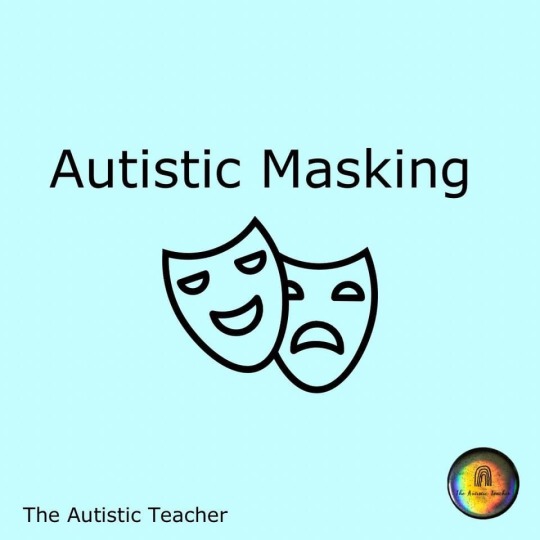



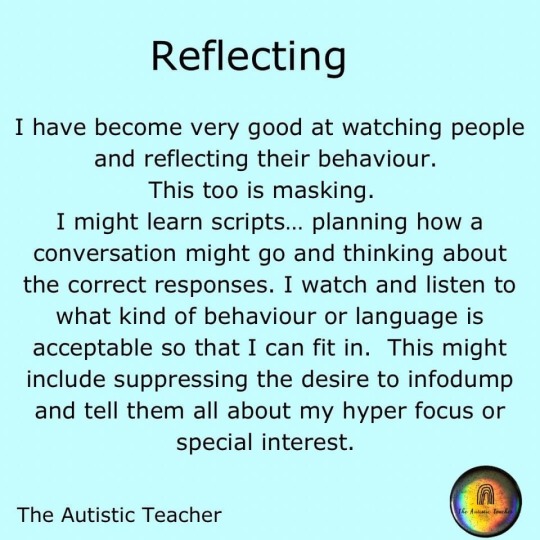
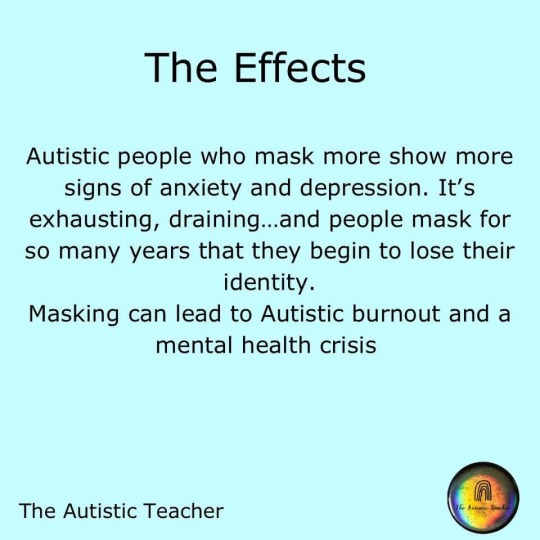
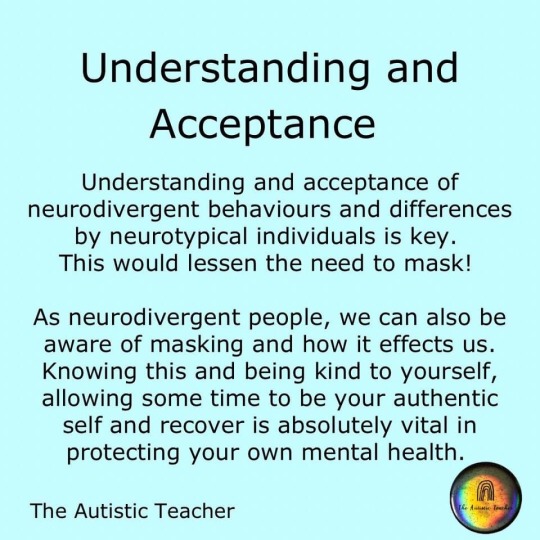
The Autistic Teacher
#autism#actually autistic#masking#why we mask#suppressing#reflecting#the effects of masking#understanding and acceptance#neurodivergence#neurodiversity#actually neurodivergent#feel free to share/reblog#The Autistic Teacher (Facebook)
190 notes
·
View notes
Text
still cannot believe vladislav "the poker" wwdits is canonically sixteen years old. and i’m supposed to be Normal about that
#yeah yeah i know#he’s been turned for like 600 years or whatever so he can’t Really be sixteen still#except you forget that his brain died with his body when he was turned.#he’s been a vampire for like 600 years and his brain cannot develop past when he died.#and its#ITS SO IMPORTANT TO HIS CHARACTER MAB#IT GIVES HIS SELFIES AND FACEBOOK POKING AND THE WAY HE STANDS SO MUCH MORE MEANING WHEN U THINK ABOUT IT#HE DRESSES LIKE A FUCKING EMO KID. BECAUSE HE IS SIXTEEN#and his lines abt 'life was tough back then for a sixteen year old' and the torture chamber#200 year rough patch. and canonically when vampires get incredibly upset they physically age right#jemaine being what 39 years old when he played vlad makes sense when you think abt it being the long term effects of vampire depression#guys. guys it makes the movie and vlads one singular episode in the show so much funnier when you remember he’s 16#i’m tired of being normal about this. cmon#wwdits#wwdits 2014#vladislav the poker#vlad wwdits#wwdits vladislav#vladislav wwdits#what we do in the shadows#wwdits movie
65 notes
·
View notes
Text
thinking of how next year or maybe even this one might be the last years of not heavily restricted internet access in my country 🥲
#p#we already have insta Twitter and probably Facebook banned and only accessible via vpn#lots of media blocked over so called lgbt propaganda#even more media blocked for opposing the government narrative of bullshit#seems like youtube is gonna be blocked next#and the worst part is these cunts are learning to make the blocking more effective#so most of the vpn services will be rendered useless in the near future#I’m reading the book on stalin’s and pre stalin repressions and it’s all happening again but now I get to experience it#yeah#I wish I could leave russia#and don’t get me wrong we absolutely deserve all the sanctions n shit
21 notes
·
View notes